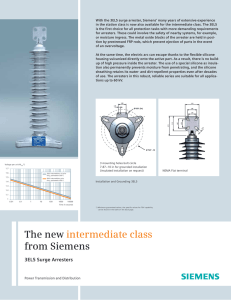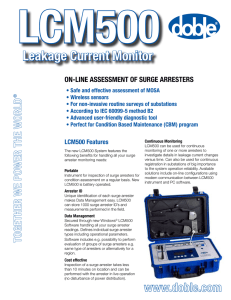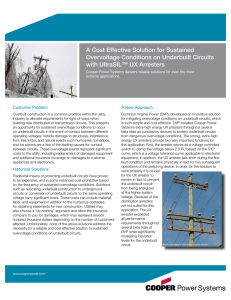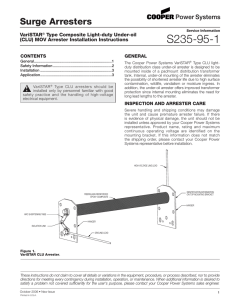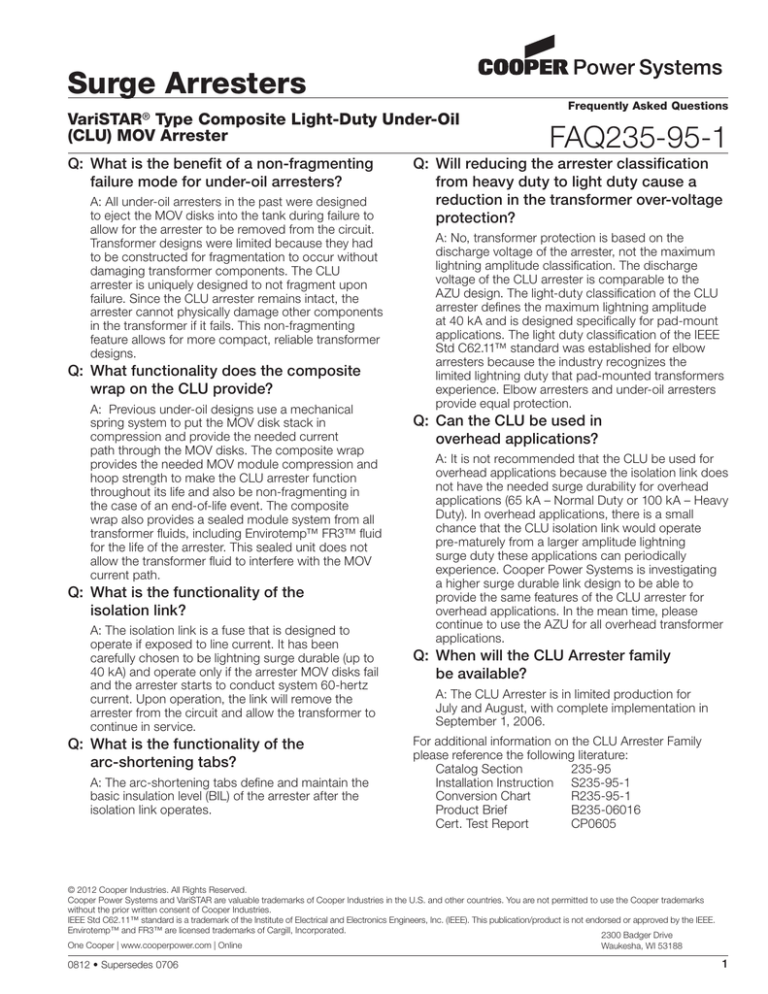
Surge Arresters
VariSTAR® Type Composite Light-Duty Under-Oil
(CLU) MOV Arrester
Q: What is the benefit of a non-fragmenting
failure mode for under-oil arresters?
A: All under-oil arresters in the past were designed
to eject the MOV disks into the tank during failure to
allow for the arrester to be removed from the circuit.
Transformer designs were limited because they had
to be constructed for fragmentation to occur without
damaging transformer components. The CLU
arrester is uniquely designed to not fragment upon
failure. Since the CLU arrester remains intact, the
arrester cannot physically damage other components
in the transformer if it fails. This non-fragmenting
feature allows for more compact, reliable transformer
designs.
Q: What functionality does the composite
wrap on the CLU provide?
A: Previous under-oil designs use a mechanical
spring system to put the MOV disk stack in
compression and provide the needed current
path through the MOV disks. The composite wrap
provides the needed MOV module compression and
hoop strength to make the CLU arrester function
throughout its life and also be non-fragmenting in
the case of an end-of-life event. The composite
wrap also provides a sealed module system from all
transformer fluids, including Envirotemp™ FR3™ fluid
for the life of the arrester. This sealed unit does not
allow the transformer fluid to interfere with the MOV
current path.
Q: What is the functionality of the
isolation link?
A: The isolation link is a fuse that is designed to
operate if exposed to line current. It has been
carefully chosen to be lightning surge durable (up to
40 kA) and operate only if the arrester MOV disks fail
and the arrester starts to conduct system 60-hertz
current. Upon operation, the link will remove the
arrester from the circuit and allow the transformer to
continue in service.
Q: What is the functionality of the
arc-shortening tabs?
A: The arc-shortening tabs define and maintain the
basic insulation level (BIL) of the arrester after the
isolation link operates.
Frequently Asked Questions
FAQ235-95-1
Q: Will reducing the arrester classification
from heavy duty to light duty cause a
reduction in the transformer over-voltage
protection?
A: No, transformer protection is based on the
discharge voltage of the arrester, not the maximum
lightning amplitude classification. The discharge
voltage of the CLU arrester is comparable to the
AZU design. The light-duty classification of the CLU
arrester defines the maximum lightning amplitude
at 40 kA and is designed specifically for pad-mount
applications. The light duty classification of the IEEE
Std C62.11™ standard was established for elbow
arresters because the industry recognizes the
limited lightning duty that pad-mounted transformers
experience. Elbow arresters and under-oil arresters
provide equal protection.
Q: Can the CLU be used in
overhead applications?
A: It is not recommended that the CLU be used for
overhead applications because the isolation link does
not have the needed surge durability for overhead
applications (65 kA – Normal Duty or 100 kA – Heavy
Duty). In overhead applications, there is a small
chance that the CLU isolation link would operate
pre-maturely from a larger amplitude lightning
surge duty these applications can periodically
experience. Cooper Power Systems is investigating
a higher surge durable link design to be able to
provide the same features of the CLU arrester for
overhead applications. In the mean time, please
continue to use the AZU for all overhead transformer
applications.
Q: When will the CLU Arrester family
be available?
A: The CLU Arrester is in limited production for
July and August, with complete implementation in
September 1, 2006.
For additional information on the CLU Arrester Family
please reference the following literature:
Catalog Section 235-95
Installation Instruction S235-95-1
Conversion Chart R235-95-1
Product Brief B235-06016
Cert. Test Report CP0605
© 2012 Cooper Industries. All Rights Reserved.
Cooper Power Systems and VariSTAR are valuable trademarks of Cooper Industries in the U.S. and other countries. You are not permitted to use the Cooper trademarks
without the prior written consent of Cooper Industries.
IEEE Std C62.11™ standard is a trademark of the Institute of Electrical and Electronics Engineers, Inc. (IEEE). This publication/product is not endorsed or approved by the IEEE.
Envirotemp™ and FR3™ are licensed trademarks of Cargill, Incorporated.
2300 Badger Drive
One Cooper | www.cooperpower.com | Online
Waukesha, WI 53188
0812 • Supersedes 0706
1

